Foodwise Autumn

Welcome to edition #59 of Foodwise!
This is the first edition of Foodwise for the year, full of great successes and initiatives that we’ve worked together to achieve and outlines many upcoming opportunities which will allow us to continue to engage with each other to keep delivering results for the NSW community.
On the back of a difficult few years due to the impact of Covid-19, 2022 has brought its own challenges with many impacted by the devastating floods across NSW. If you are experiencing hardship as a result of the floods please contact Service NSW to be connected with any financial or other assistance you may be entitled to.
We hope you enjoy this edition of Foodwise. As always, we welcome your comments and feedback, so please feel free to drop us a line with any suggestions.
For more information visit the NSW Food Authority website, email food.contact@dpi.nsw.gov.au or call the Helpline on 1300 552 406.
Salmonella reduction success for NSW
The results are in and NSW’s food safety regulator has received top marks in its goal of reducing foodborne salmonellosis by 30% as part of the NSW Food Authority’s Food Safety Strategy 2015-2021.
NSW Food Authority CEO Dr Lisa Szabo said the NSW Food Safety Strategy 2015-2021 was an ambitious undertaking that was born out of need following record numbers of Salmonella infections and food poisoning outbreaks reported over the 2010-14 period.
“We identified a need to combat this increase, and that began with empowering food businesses with information and education, helping to instil a food safety culture within the sector, and introducing world-leading surveillance of foodborne pathogens,” Dr Szabo said.
“By starting with that as a foundation, it was a far easier task to successfully meet the strategy’s objectives which included the specific target of a 30% reduction of foodborne salmonellosis.”
“Under that umbrella target, incidence of the main Salmonella strain responsible for food poisoning in NSW and Australia fell by 60%.
Dr Szabo said in addition to illness in the community, another unwelcome consequence of increasing outbreak numbers was increased health care costs and resource burden for NSW consumers and affected government agencies.
“Achieving a reduced regulatory burden and reduction in health care cost not only ensures the on-going confidence in the NSW food sector but has a positive impact on the broader community.
“The direct outcome of achieving the 30% reduction target was an estimated 40,000 fewer people contracting salmonellosis and a saving in health care costs of approximately $196million between 2017 to 30 June 2021.
Dr Szabo said key to the achievement was improving capacity for early identification and intervention.
“An analysis of the outbreaks during the reporting period of 2010-14 identified some common root causes of food poisoning including a lack of understanding in some businesses of proper cleaning and sanitising practices, and the mishandling of eggs used in foods that did not involve a cooking step or other processing.
“Working closely with industry and our stakeholders, we focused on measures aimed at addressing those causes,” she said.
“This was complemented by improved disease surveillance, supported by whole genome sequencing technology implemented by NSW Health, to identify outbreaks of illness at the earliest opportunity and halt spread in the community.”
Dr Szabo said the use of genome sequencing enabled the state’s health system to swiftly identify previously undetectable clusters of foodborne disease.
“This is a hugely exciting step forward, because faster detection means faster response and fewer people becoming ill.
“These achievements cannot be underestimated,” Dr Szabo said.
“The use of this technology was instrumental in the control of a Salmonella strain threatening consumers and the egg industry in 2018.
“Interventions to control this strain are estimated to have prevented over $2billion in losses to the egg industry over a 20-year projection.”
The strategy’s objectives went beyond harnessing new technologies and took a holistic approach working with other teams within the NSW Department of Primary Industries (DPI) Biosecurity & Food Safety Branch, NSW Health, local government, Registered Training Organisations (RTOs) and key food industry stakeholders.
“The success of the reduction strategy was in no small part due to our ability to work together.
“Over the life of the strategy about 72,000 people in NSW were trained and certified as Food Safety Supervisors (FSS) for their business, while the Food Authority and local councils developed and implemented a compliance strategy targeting high risk foods and poor food handling in the foodservice sector.
In addition to the health and safety benefits and savings, the success of the strategy positions the NSW food sector as a premium product, maintaining its strong brand reputation and providing NSW food businesses with domestic and export market opportunities, in turn contributing to the state’s economic growth and prosperity.
Further food safety information is available at the NSW Food Authority website.
The NSW Government Food Safety Strategy 2015-2021 can be found at www.foodauthority.nsw.gov.au/sites/default/files/_Documents/corporate/Food_Safety_Strategy.pdf
(Full article as it appeared in the Spring 2021 edition of food australia)
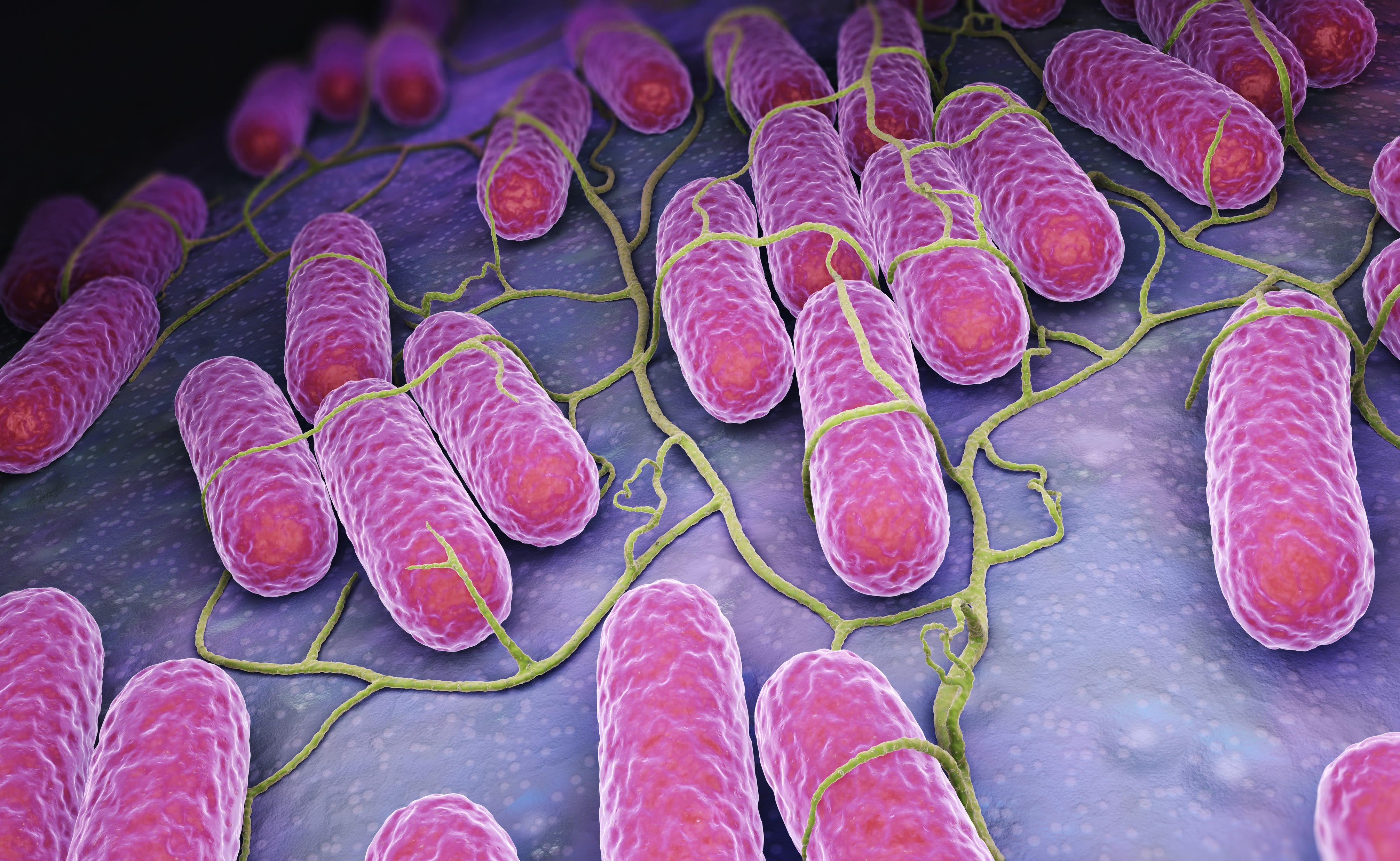
The Easter Show is coming to town!
The countdown is on for the Sydney Royal Easter Show, which kicks off on Friday 8 April, and closes on the evening of Tuesday 19 April.
With the Royal Agricultural Society (RAS) of NSW celebrating their 200 year anniversary in 2022, this year's Show is set to be bigger than ever as they mark their bicentenary.
The NSW Food Authority can’t wait to be part of it.
The Food Safety Investigation (FSI): Kitchen Crime Squad stand was a huge hit with families last year, and this year the squad will be back with a few new tricks up their sleeve to help visitors find out what made Barry and Sally so sick.
Kids are encouraged to come and join the Squad and use their detective skills as they move through the interactive ‘crime zones’ to identify food safety issues in a contaminated kitchen scene, find the guilty offender in a fridge ‘line up’ and learn about the Golden Rules of Food Safety.
Once the crime is solved, kids will be presented with a Junior FSI Squad bag and workbook with extra ‘sleuth’ activities, including an activity to star rate the cleanliness and food safety level of their kitchen at home.
Expert Food Authority staff will be on hand throughout the show, providing food safety advice and answering further questions from future detectives
This year, the Food Safety Investigation Squad stand is in a different location. You’ll still need to follow the Animal Walk footprints but you’ll now find us in the Food Farm in its new pavilion on Orana Parade, next door to the Cattle Lawn.
The RAS of NSW continues to work with NSW Health to ensure a COVID safe event.

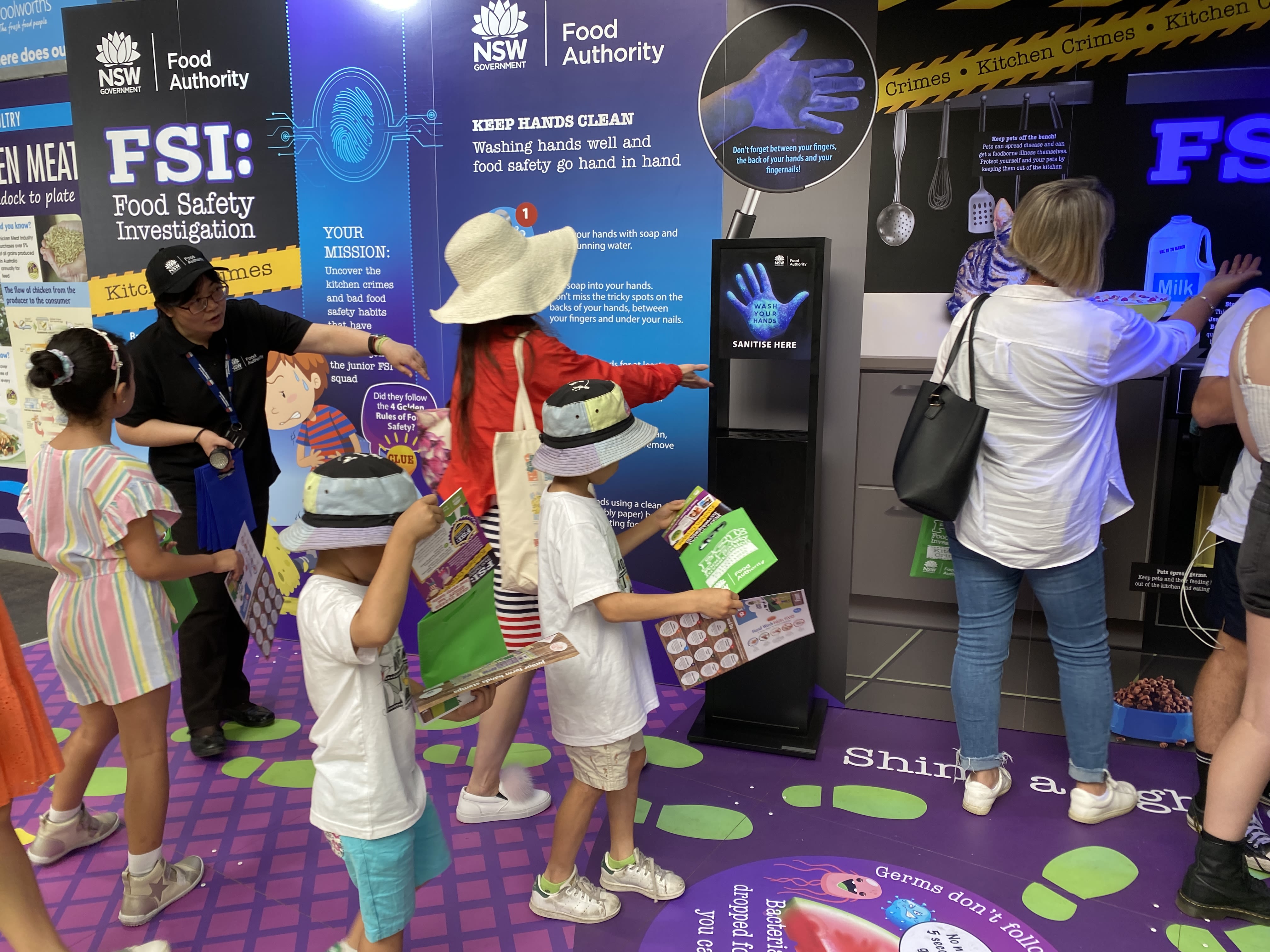
SAVE THE DATE – training for Regulatory Food Safety Auditors
The NSW Food Authority requires that auditors who have applied to become approved Regulatory Food Safety Auditors in NSW attend a 2-day training session, once their application has been processed and confirmed as successful.
The next scheduled training dates are:
- Wednesday 15 June and Thursday 16 June 2022
Applicants have the option to attend either face-to-face in Newington or via video conference.
Only participants who receive confirmation of their successful application can attend this training.
For more information visit Auditor Training on the NSW Food Authority website.

Regulatory Food Safety Auditors training
Regulatory Food Safety Auditors training
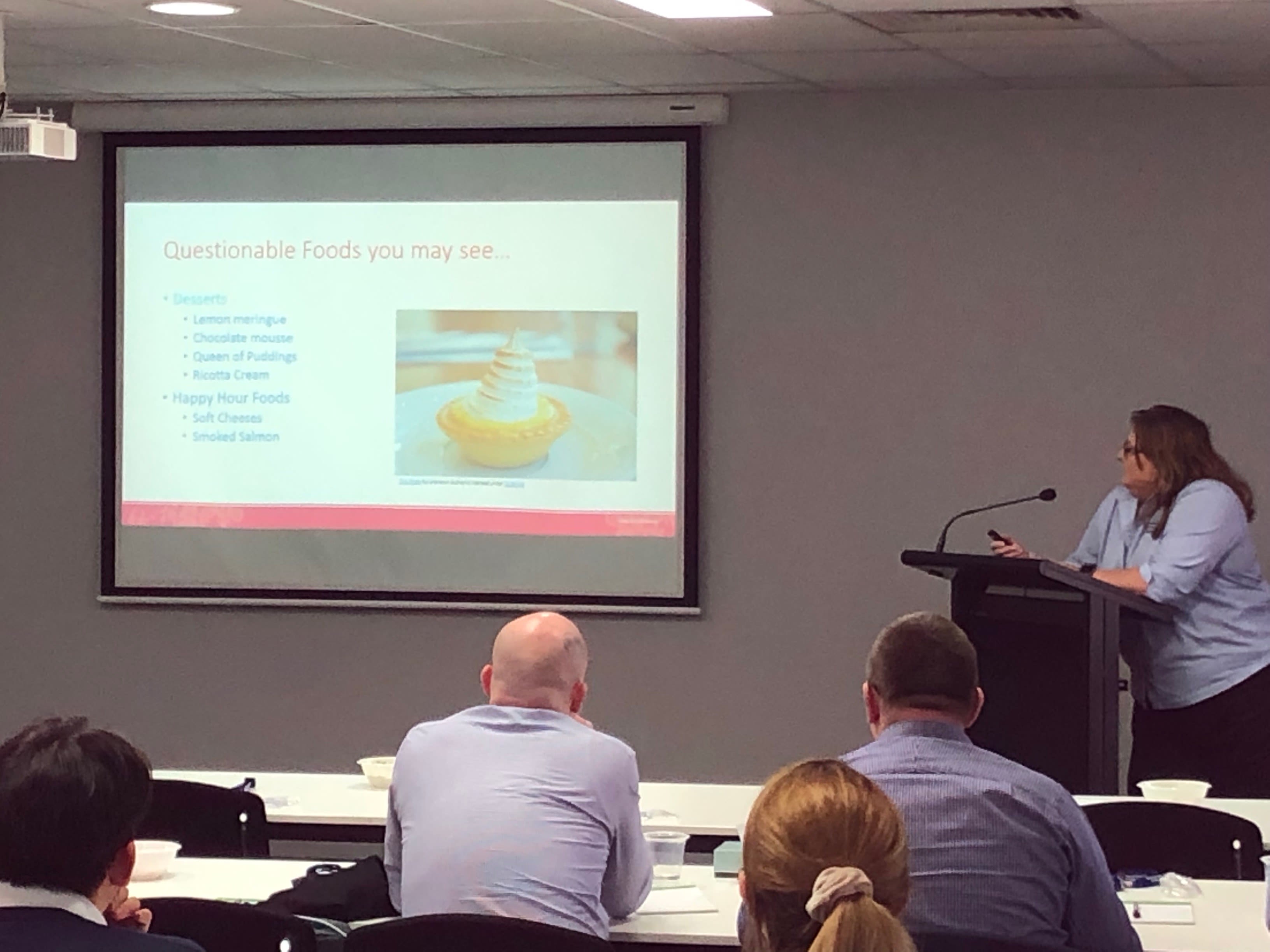
Regulatory Food Safety Auditors training
Regulatory Food Safety Auditors training
Are you interested in becoming a Food Safety Auditor?
Put your skills as a food safety professional to good use and apply to become a Regulatory Food Safety Auditor (RFSA) - also known as third party or commercially employed auditors. You will be self-employed but will have the opportunity to perform food safety audits of certain sectors in the NSW food industry.
The NSW Food Authority has developed a Regulatory Food Safety Auditor System to approve persons other than Food Authority employees to conduct regulatory food safety audits of licensed food businesses in NSW.
Any person wishing to become an auditor must have appropriate qualifications, be trained and assessed on the system and be individually approved by the NSW Food Authority.
For more information on how to become a Regulatory Food Safety Auditor, visit the Third party audits (TPAs) page on the NSW Food Authority website.
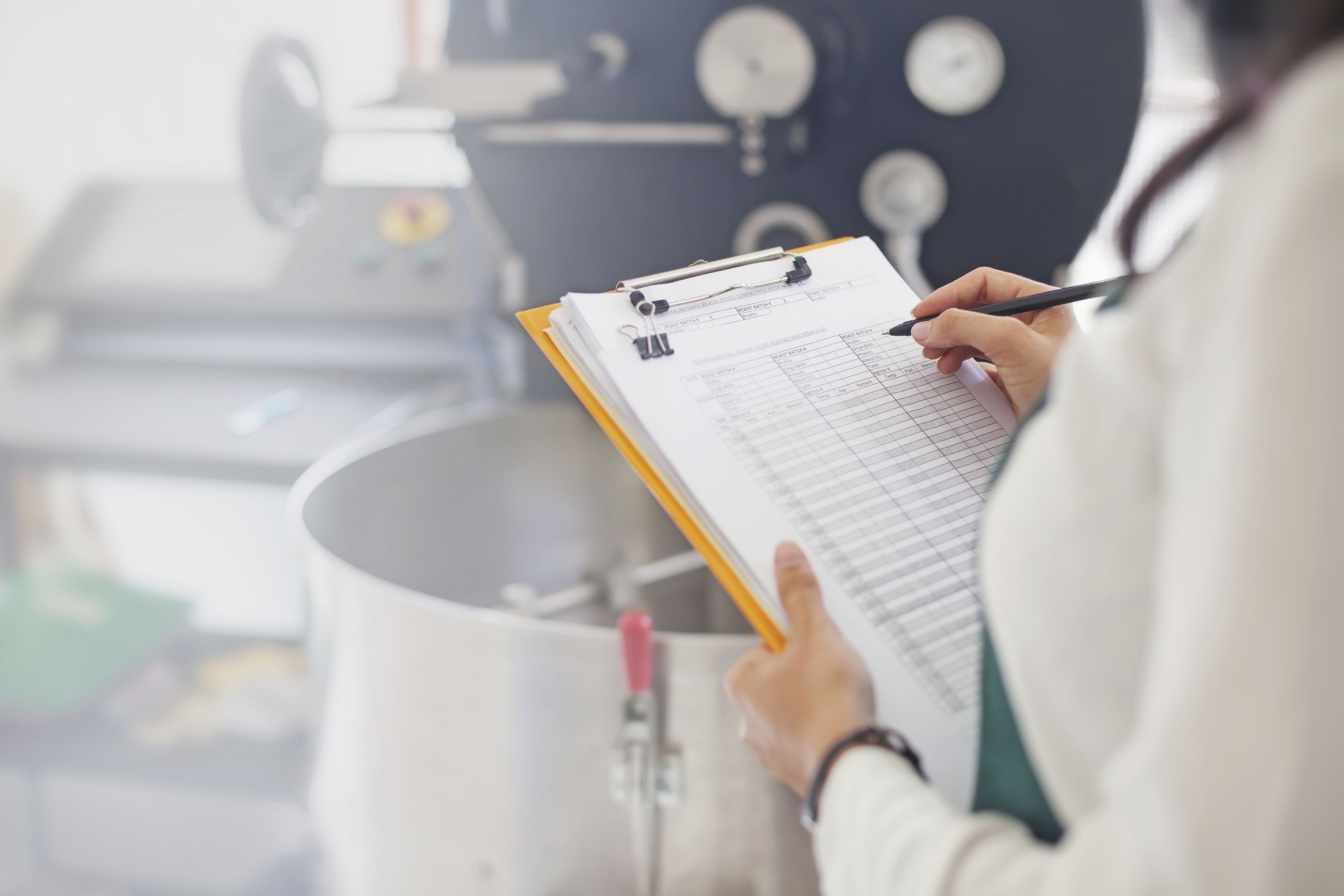
Who does your regulatory food safety audits?
Did you know that some businesses are able to use the services of a Regulatory Food Safety Auditor (Third party auditor) instead of being audited by persons from the NSW Food Authority?
The NSW Food Authority has developed a Regulatory Food Safety Auditor System to approve persons other than the Authority employees to conduct regulatory food safety audits of licensed food businesses in NSW.
Regulatory food safety auditors (RFSA) may also be known as third party or commercially employed auditors.
Businesses licensed for the activities listed below may apply to move to this system.
Facilities that conduct multiple activities should contact the NSW Food Authority for clarification.
- Facilities licensed to provide food to vulnerable persons (hospitals and aged care)
- Cold food storage
- Dairy primary production (dairy farms)
- Plant products
- Seafood processing
- Seafood processing – RTE products
- Seafood processing – RTE including wet storage
- Aquaculture with processing, excluding shellfish – RTE products
Licensed food businesses in other industries will be informed when they can apply to use this system.
What are the benefits of using a RFSA auditor?
- Fixed price or negotiated audit fees.
- Scheduling of audits
- Direct point of contact for audit outcomes
- A facility must apply to the NSW Food Authority to engage a regulatory food safety auditor.
To be considered, a business must:
- have a suitable audit and compliance history
- have received an A or B rating at their two most recent audits
- have no outstanding enforcement action
- make application using form TPA006 (pdf 42KB)
The minimum requirements for licensed facilities to be approved are detailed in the Guide to Implementing a Regulatory Food Safety Auditor System (pdf 164KB).
If you would like to talk to one our experienced regulatory food safety auditors, refer to the TPA list on the Food Authority website where you can search for them by name, endorsement or region.
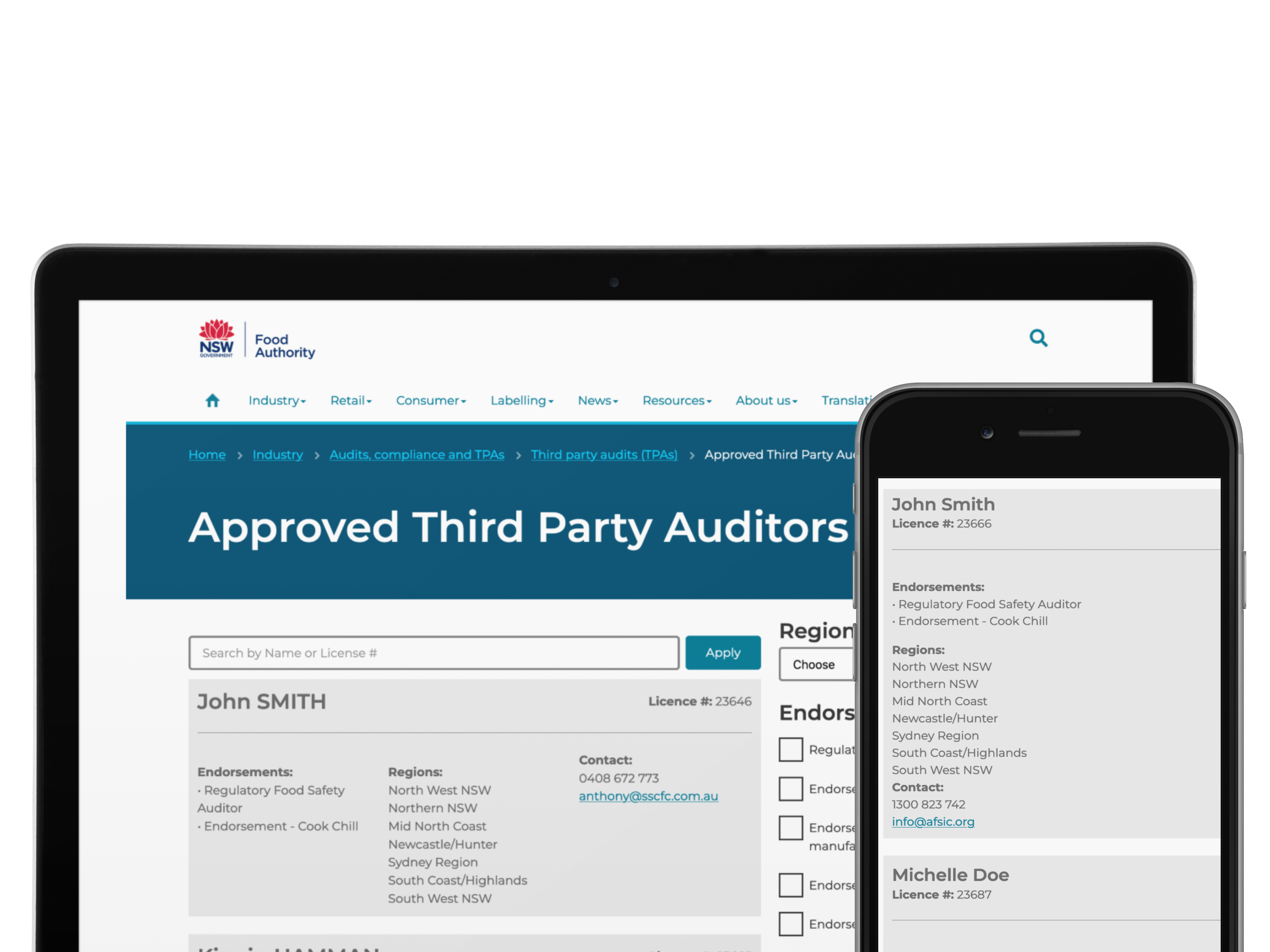
If you would like to talk to one our experienced regulatory food safety auditors, refer to the TPA list on the Food Authority website where you can search for them by name, endorsement or region.
If you would like to talk to one our experienced regulatory food safety auditors, refer to the TPA list on the Food Authority website where you can search for them by name, endorsement or region.
Biosecurity & Food Safety Compliance and Enforcement Policy - updated
The updated NSW DPI Biosecurity and Food Safety Compliance and Enforcement Policy outlines our compliance principles, how NSW DPI Biosecurity & Food Safety promote voluntary compliance, create deterrence, and the decision-making criteria for deciding appropriate enforcement action using a graduated and proportionate approach to drive compliance. The policy also supports our risk-based, outcome-focused approach to compliance and enforcement activities.
Through the NSW Food Authority, DPI is also responsible for regulating and monitoring food safety across the entire food industry supply chain in NSW - from paddock to plate.
The Policy details how the NSW Food Authority is to achieve the objectives of the Food Act 2003 in a manner that is procedurally fair, accountable and transparent, and proportionate.
We aim to build a culture of voluntary compliance and empower licensees, stakeholders and other invested parties (including the community) to be responsible for their actions and to reduce, if not remove, any potential for harm.
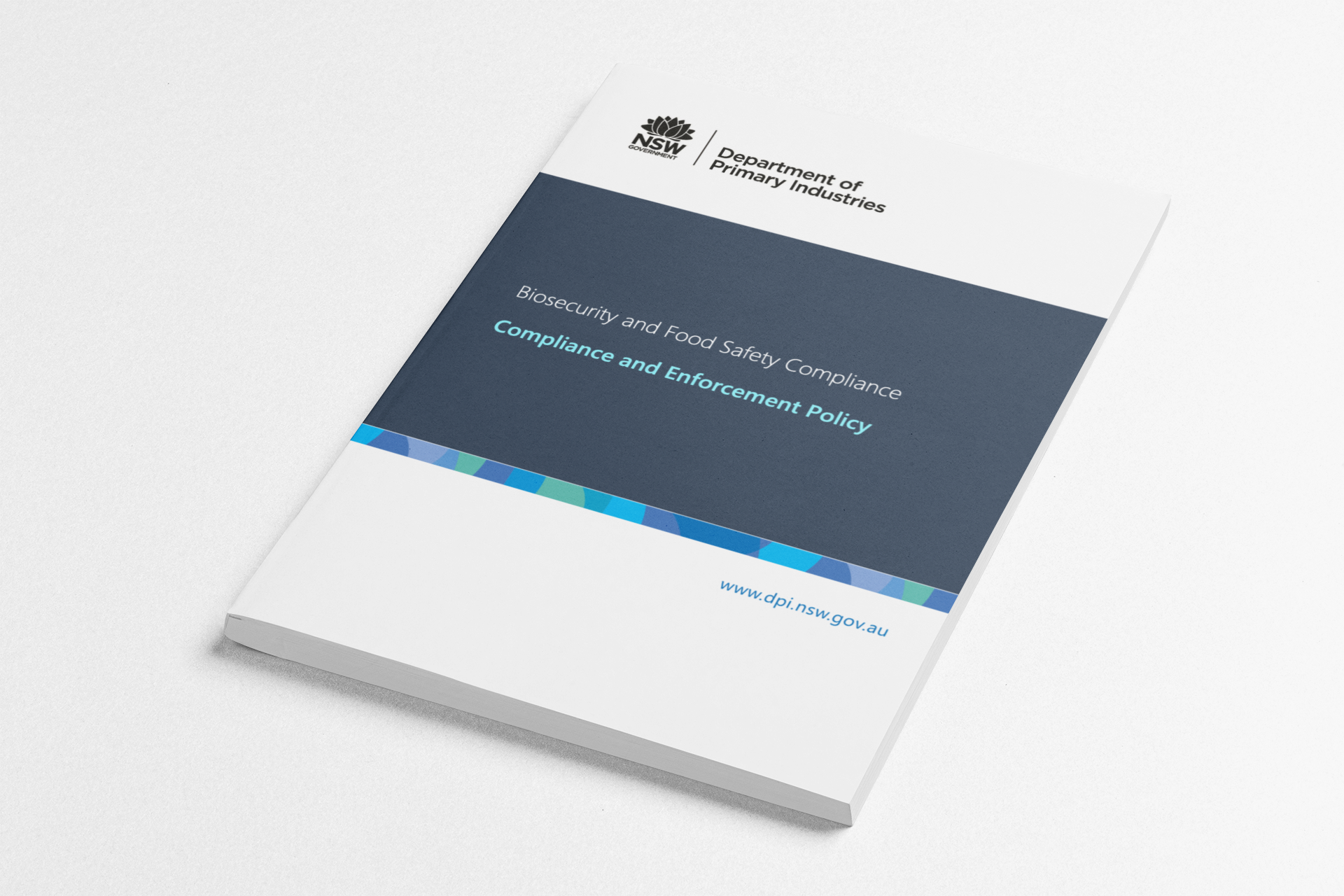
Regulatory Framework - updated
The updated Regulatory Framework PDF, 351.84 KB details the core responsibilities and regulatory principles for NSW DPI Biosecurity & Food Safety Compliance, and the way we approach our responsibilities. These principles support a risk-based, outcome-focused approach to regulation which support and influences the way we perform our functions, exercise our powers, and engage with industry and the community.
Biosecurity & Food Safety Compliance is responsible for a range of regulatory and non-regulatory programs and seek to effectively regulate and educate stakeholders by understanding and managing the risks associated with our programs. The food safety programs include:
- Labelling
- Foodborne illness investigations
- Food Safety Supervisor
- Food Regulation Partnership
- Food Safety Schemes covering the Dairy, Meat, Seafood, Egg, Plant Products and Vulnerable Persons sectors
- Manufacturer and Wholesaler Inspections
- Third Party Auditor
We review our programs regularly, assessing our effectiveness, driving improvements in program delivery and enabling us to refocus our efforts to address emerging risks.
You’ll find the Regulatory Framework and other important compliance information, including compliance programs, and current strategic priorities for NSW DPI Biosecurity & Food Safety Compliance on the Compliance page of the NSW DPI website.
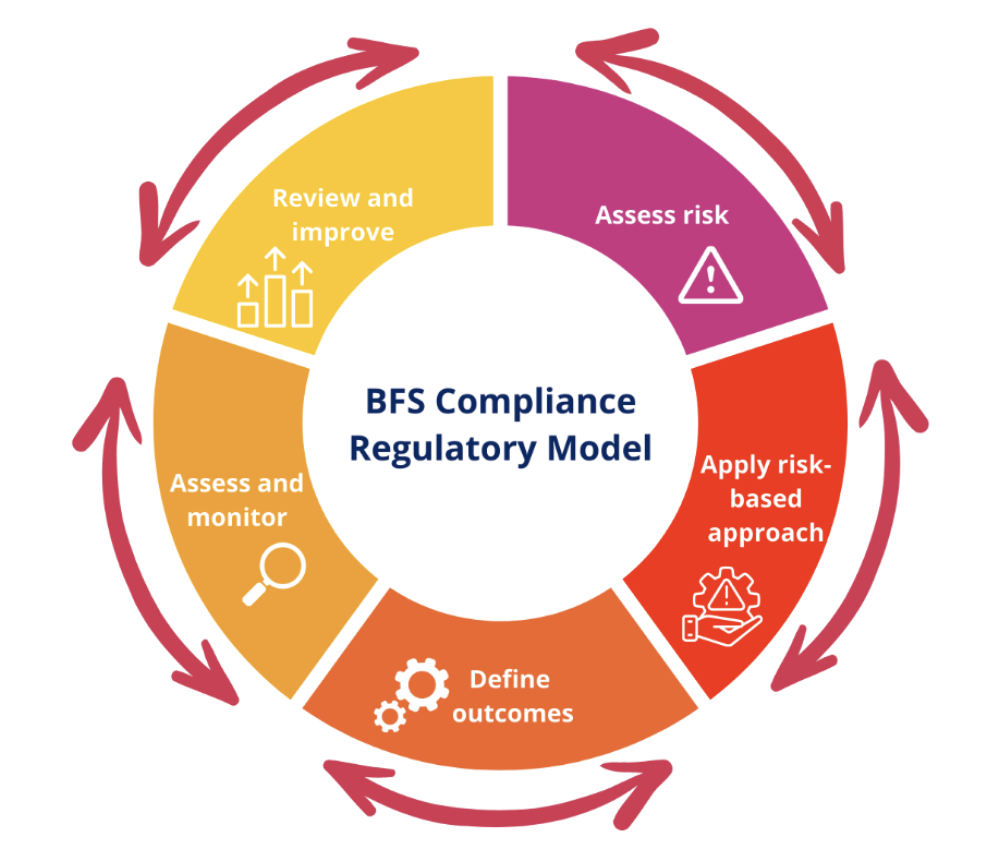
Our regulatory model
Our regulatory model
Online food labelling resources for businesses
Don’t know if you need a food label? Or what information you need on your label and how to display it?
Two online interactive resources have been developed for small to medium food enterprises to help with understanding when and how to label food.
Do I need a food label? is an interactive online quiz that provides guidance on whether or not a label is needed, or if there are other information requirements. The quiz is available on the Food Authority website.
What do I need on my label? is an interactive step-by-step guide that helps small to medium businesses navigate and understand the complex world of food labelling. Users enter information specific to their food product to produce a guide for their labelling requirements.
What do I need on my food label?
What do I need on my food label?
What do I need on my label? enables users to:
- Learn about food labelling requirements.
- Save a draft to return to and finish later.
- View a guide specific to a product on screen, save it, and download it in a PDF format.
- Clone a saved product to start a new one that is similar, without starting from scratch.
- Create a link that can be saved and shared.
- The resource can also be used to navigate directly to information about specific sections of a food label.
Use this link to try out and use the new tool, and provide feedback via the simple online form on each page - What do I need on my label?
The new resource will be available on the Food Authority website in March.
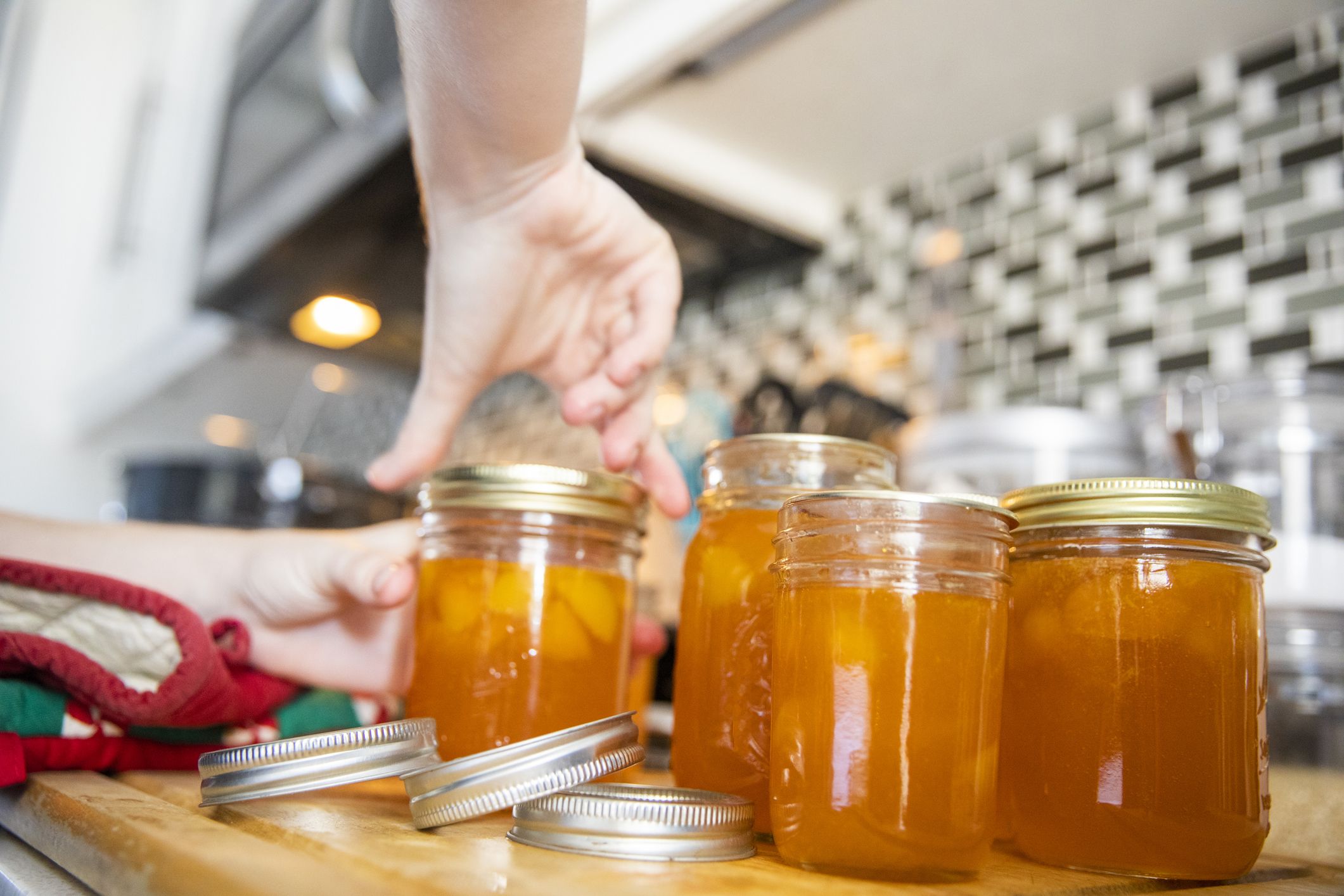
Peter Day calls it a day with DPI Biosecurity and Food Safety
Following a varied and distinguished career with the NSW Department of Primary Industries Peter Day has finished up with the Department to take on the role of Executive Director with the NSW Resources Regulator.
A familiar name and face to many in the food industry, Peter Day, most recently the Director Compliance and Integrity Systems within NSW DPI’s Biosecurity and Food Safety group, held leadership roles within the Department for more than 20 years.
Peter started with the NSW Food Authority in 2001, he was Executive Director of the Authority’s Compliance, Investigation & Enforcement team from 2008 and in 2015 Peter brought his breadth of experience to the Biosecurity and Food Safety group when the NSW Food Authority was realigned with NSW DPI.
Taking on that role saw his skill set expand from working primarily in the food space to include a broader focus on biosecurity issues. Peter has been influential across NSW and Australian government and industry as a valued Chairperson and key participant on a range of industry and government committees including representation on various food industry committees such as the national Implementation Subcommittee for Food Regulation (ISFR), FSANZ working groups particularly in the development of the Primary Production and Processing standards and more broadly the Rural Crimes Advisory Committee, SafeMeat, the Bee Industry Consultative Committee and cattle tick among others.
Peter also chaired the Covid Regulators Sub Committee with the purpose of collaborating on unfolding events, forming priority LGAs for inspections and providing consistency with compliance work across multiple regulatory agencies.
Notable career highlights for Peter include:
- Leading national and state food safety incident responses in events such as the IRT Aged Care Salmonella outbreak, Jindii Cheese and Rombola Rockmelon Listeria outbreaks and also provided leadership in biosecurity responses including Salmonella Enteritidis in the egg industry, neglected/abandoned orchard programs and Citrus Canker detection
- A focus on reform and industry engagement. Peter successfully devised and implemented cultural and operational change which has delivered significant benefits including quality regulatory framework and cost recovery for food safety and biosecurity systems across various industries
- Implementing quality regulatory services framework into food safety and biosecurity by driving cultural change and reforming operational service delivery models focusing on outcomes and industry partnerships. More recently this included the implementation of the online bee registration portal, licensing business processes for animal welfare, the opium poppy and hemp industry and the interstate certification assurance (ICA) scheme
- Delivery of field wireless technology to field staff resulting in 25% increased productivity and enhanced business outcomes, results which in turn benefited the industries they are supporting
Over two decades of service Peter developed a reputation of professionalism and delivering significant quality and timely outcomes for industry.
A respected leader, mentor and friend to many Peter's dedication and hard work with the NSW Food Authority, and NSW DPI’s Biosecurity and Food Safety unit will continue to deliver lasting benefits for the Department, industry and NSW for many years to come.

Peter Day
Peter Day
RETAIL
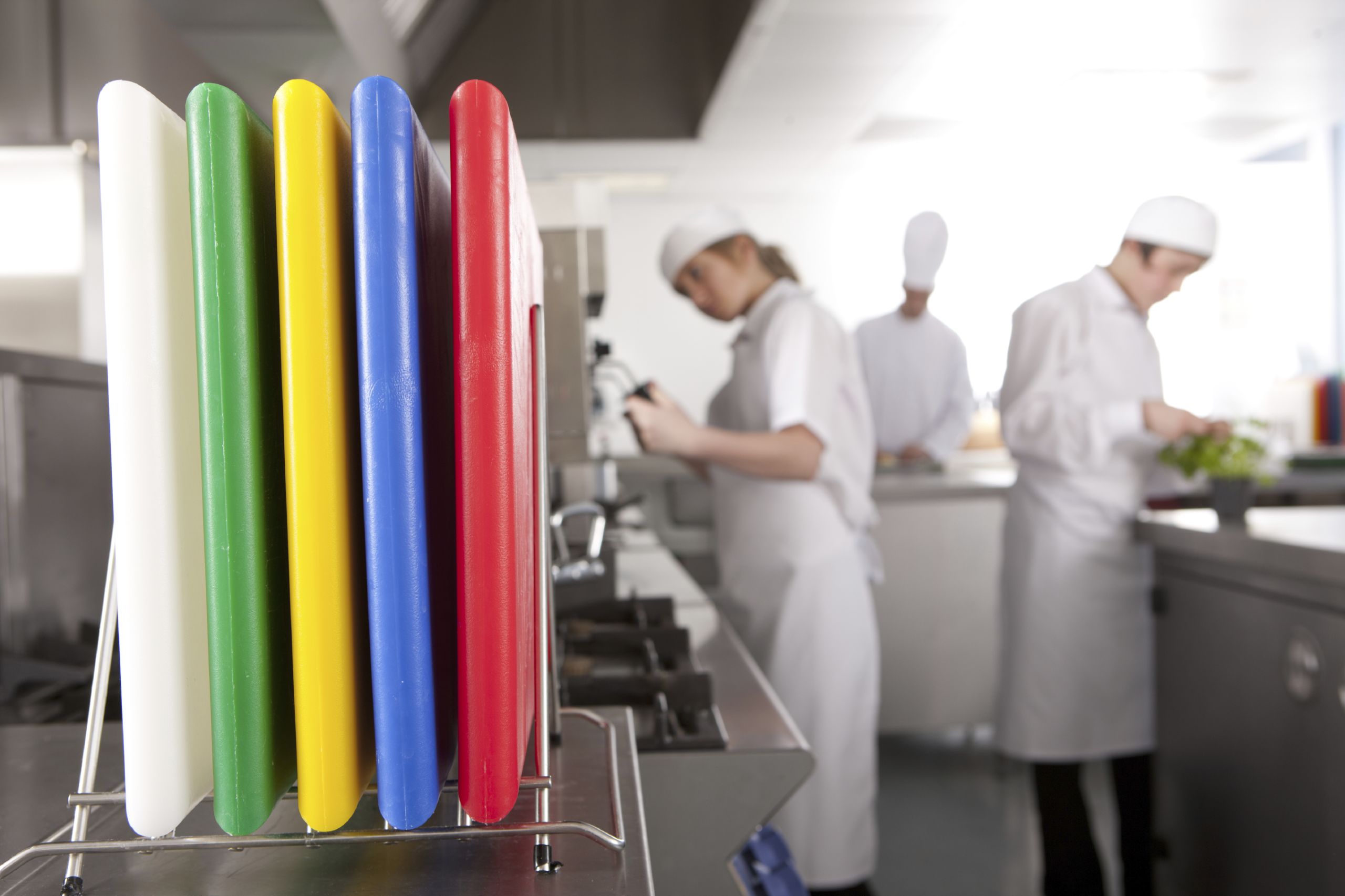
Looking at Campylobacter in a retail food setting
The NSW Food Authority (Food Authority), in partnership with local councils undertook a survey of retail food outlets in NSW as part of the Campylobacter reduction strategy.
Campylobacter is a leading cause of foodborne illness in Australia and world-wide.
The NSW Food Authority’s Food Safety Strategy 2015-2021 outlined an ambitious goal of reducing foodborne illness caused by Salmonella, Campylobacter, Listeria and allergen contamination by 30%.
As raw chicken and liver are known sources of Campylobacter, the aim of this survey was to explore if and how Campylobacter is transferred to ready to eat (RTE) product in retail premises.
The on-site survey of retail food businesses took place across 22 local councils in NSW and represented a range of local government areas including metropolitan, regional, and rural. It involved authorised officers answering a questionnaire on the food businesses’ food handling practices, undertaking protein swabbing of supposedly clean surfaces that yielded instant indicative results of the surfaces’ cleanliness, and taking samples of RTE chicken or liver products for microbiological analysis.
The survey involved 169 retail food premises with 593 swabs taken and 281 food samples analysed. The microbiological analysis involved testing for the presence and level of Campylobacter, presence of Salmonella & level of E. coli. Of the food samples analysed, 258 were in-scope (i.e., RTE chicken & pate). Of these, two (less than 1%) were contaminated with Campylobacter at a level of less than 100 cfu/g. According to the NSW Food Authority’s ‘Microbiological quality guide for ready-to eat foods’, these results can be considered a ‘fail’ as they are outside the expected microbiological levels and presents a potential food safety concern.
Neither Salmonella nor E. coli were detected in these two samples. E. coli was detected in a further eleven of the 258 samples (4.3%). The level of E. coli ranged from 3 to 93 MPN/g. Councils’ authorised officers have conducted follow up work with the relevant premises to ensure improvements have been made. Salmonella was not detected in any of the 258 in-scope samples.
Of the 593 surfaces swabbed, protein was not detected in 58% (343 surfaces) and these could therefore be considered clean and a “pass”, whereas 42% (250 surfaces) were considered a “fail”. However, of the two premises that yielded positive Campylobacter results in food samples, nine surface swabs were taken and of these, only 22% (two swabs) passed and 88% (7 swabs) failed.
Proper cleaning and sanitising by food businesses is important in the prevention of the spread of Campylobacter and other microorganisms in food premises and is carefully examined during food safety inspections by authorised officers.
Results of the questionnaire indicated that while some good food handling practices were observed, there is room for improvement in areas such as the use of sanitisers in accordance with the manufacturers’ instructions, temperature control of high-risk foods during processing and display, and food handler skills and knowledge.
Overall, the on-site survey provided an opportunity for authorised officers to focus on a risk-based approach to food safety inspection, enhance their skill set, and provide important food safety information to retail food businesses.
Local councils can access the full report on the FRP Portal.
Mosman Retail & Food Service Information Session
The importance of cleaning and sanitising, preventing foodborne illness and understanding food labelling requirements were key discussion points at the recent Retail & Food Service Information Session, held in Mosman on Tuesday, 22 February 2022.
Mosman Council Mayor, Cr Carolyn Corrigan and General Manager, Mr Dominic Johnson both delivered welcome addresses, highlighting the importance that Council places on food safety, which is evidenced by their high level of compliance.
Josie Rizzo from the NSW Food Authority’s Local Government Unit provided a highly engaging and interactive demonstration on hand hygiene training using the Glitterbug range of products that are invisible to normal light (like germs), but glow under ultra-violet light.
Effective and proper handwashing is critical in stopping the spread of bacteria, diseases, and germs. This session provided the platform for further discussion on what causes foodborne illness, and the steps that retail food businesses should take to prevent it. Additionally, the Manager of the local Government Unit, Andrew Davies spoke about the importance of food labelling.
This Retail and Food Information Session was co-hosted by Mosman Municipal Council in conjunction with the NSW Food Authority as part of the Food Regulation Partnership. It was fantastic opportunity for attendees to see a joint commitment to food safety in one of the waterfront suburbs north of the Sydney Harbour Bridge.
Other topics presented at the Mosman session included:
- An overview of the Food Regulation Partnership
- Outcomes of the Mosman Community Survey which included a 99% compliance rate of keeping food premises safe
- A Food Legislation overview
- The role of Councils EHO’s, and their common findings during inspections with a focus on cleaning and sanitising, food storage, temperature control, pest control and maintenance.
- Mosman Council’s role during the COVID-19 pandemic
The NSW Food Authority holds three sessions a year to bring together local food businesses, council Environmental Health Officers (EHOs) and representatives from the NSW Food Authority. The session allows business operators to learn more about the resources that are available to support them and provides the opportunity to be in the room with the regulators in an informal and supportive environment.
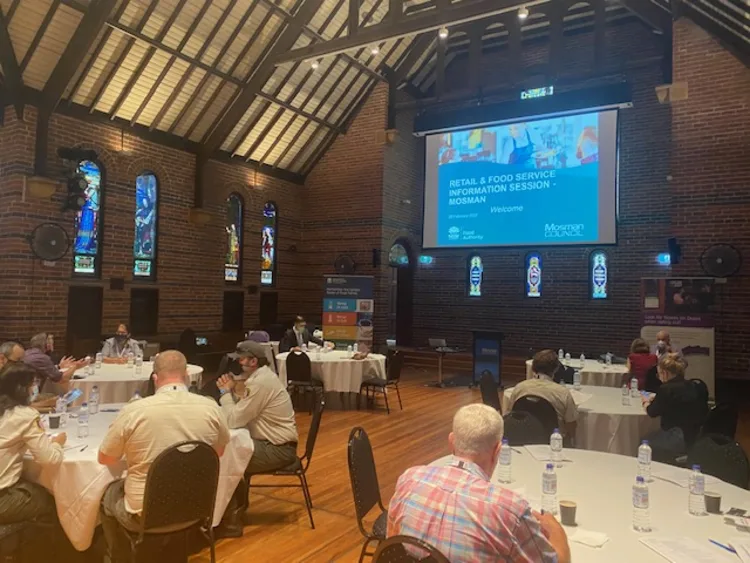
If you’re a retail food business in the Snowy Valleys area - SAVE THE DATE!
Snowy Valleys Council together with the NSW Food Authority are hosting the next Retail and Food Service Information Session on Wednesday 18 May from 9.30am - 12.30pm at Club Tumut.
More information will be provided closer to the date.

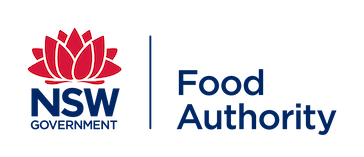
Checking in on the Food Regulation Partnership
The NSW Food Authority (Food Authority) operates a formal partnership with all 128 NSW local councils to ensure all sold food in NSW is safe to eat.
The Food Regulation Partnership clarifies the responsibilities of local government in relation to food regulation, improves food safety coordination, enables quicker responses to food emergencies and food recalls, and enables all councils to recover the costs of food regulation enforcement. The Food Regulation Partnership model includes a comprehensive program to support and assist council roles in food regulation
The Food Authority’s Local Government Unit (LGU) reached out to all environmental health officers (EHOs) to seek feedback on the Food Regulation Partnership and the services provided by the Food Authority to support local councils.
The primary aim of the survey was to gain an understanding of how EHOs feel about the Food Regulation Partnership and the services provided by the Food Authority. Additionally, it aimed to identify what is working well and where improvements can be made, with a view to continually improving the partnership.
The 30-question survey was distributed to all NSW EHOs in 2020. There were 217 respondents, representing all 16 regional food group regions. The survey questions sought information on council information, services, materials and support provided to local councils, local councils’ food surveillance procedures, and opinion on the Food Regulation Partnership.
Some key responses include:
- 90% believe the FRP is making retail food safer
- 83% of respondents believe the services, material and support are ‘effective’ (62%) or ‘very effective’ (21%)
- 89% rated the Regional Food Group meetings as ‘excellent’ (48%) or ‘very good’ (41%)
- 96% rated communication with EHOs as ‘excellent’ (33%) or ‘very good’ (63%)
- 51% record inspections manually, 24% used a mobile device (with manual entering to current system)
The results indicate the strength of the partnership, but also reveal a number of important areas where services, materials and programs might be improved.
The positive elements identified by stakeholders included the quality and availability of regulatory support materials, assistance with food regulatory enquiries and general communications between the Food Authority and local councils. There is strong appreciation and support for the regional food group meetings which take place between local councils and the Food Authority.
In contrast, specific Food Authority communication to local council General Managers, retail food businesses and the general public has been identified as an opportunity for improvement. Also, a dedicated meeting between the Food Authority and senior council staff was supported as an important initiative.
Other key themes and issues arising from the responses received included:
- Perceived inconsistency in food inspection procedures between councils
- need for better communication with food businesses and the general public
- need for more online materials to support EHOs
- lack of experienced (5+ years) EHOs across some councils
- challenges from the emergence of home-based food businesses and online sales
- difficulties managing food safety surveillance of some mobile and temporary food premises that cross multiple local government areas
- the need for greater regional visibility with the Food Regulation Partnership.
The Report sets out the feedback and states what programs, initiatives and future opportunities to action; many of which have been initiated already. This includes the Managers and Contractors Forums which took place during 2021, and a collaborative project involving local councils and the Food Authority focussing on low-visibility food premises such as home-based businesses and ‘dark kitchens’ which is currently underway.
With valued feedback from EHOs, the Food Authority can continue to strive to provide relevant, quality services to improve the strength of the Food Regulation Partnership and continue to explore new opportunities to develop appropriate food safety initiatives.
Local council EHOs can access the full report on the FRP Portal.

Photo by celeste & sam on Unsplash
FRP Workshop rescheduled to 2023
The NSW Food Authority’s Local Government Unit, in partnership with local councils, host a biennial FRP Workshop for environmental health officers (EHOs), with the last one being held in 2019.
The FRP Workshop aims to enhance EHOs’ food surveillance capacity, promote professional networking, strengthen the Food Regulation Partnership (FRP), and provides opportunity for consultation on key messages and issues to a large group of stakeholders at the one time
Originally due to be held in August 2021, and postponed until March this year, a decision has been made to again reschedule the Workshop due to the continued uncertainty surrounding COVID-19.
The FRP Workshop is a key engagement and networking activity for all involved, and the impacts of potentially not being able to deliver this face-to face engagement opportunity and realise the benefits from doing so, has helped to inform this decision.
The FRP Workshop will now take place at the same venue as previously planned, Rydges World Square Sydney, from 27-28 April 2023. More information will be made available closer to the date.

MEAT
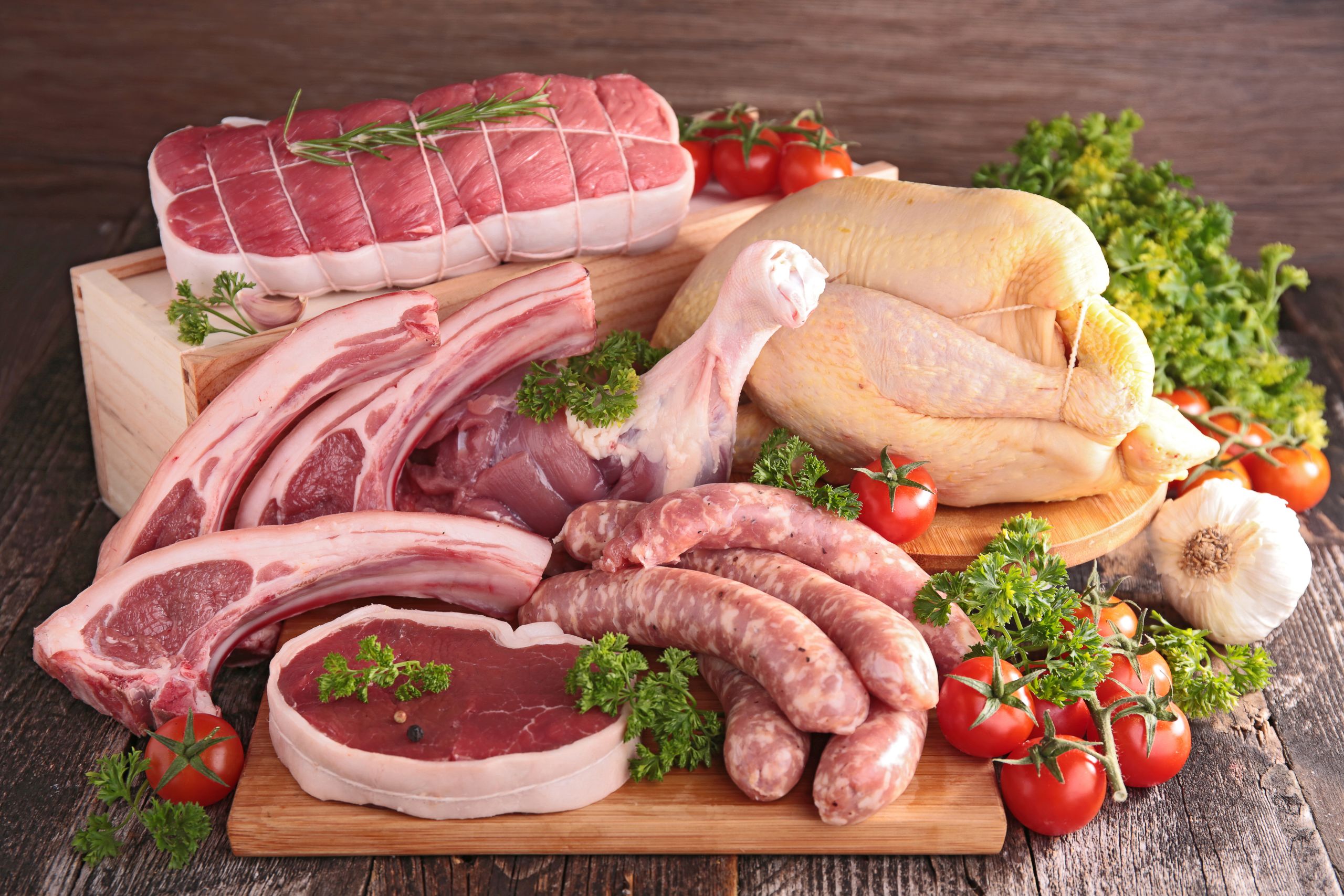
Inspections and audits
From October 2021 to December 2021, the Food Authority conducted 98 inspections and 337 audits of licensed meat businesses. This industry sector has recorded a compliance rate of 94%.
The main audit items attracting Corrective Action Requests (CAR’s) during the period were for Process Control (failure to complete monitoring records or to identify cross contamination risks), Food Safety Program issues, and Analytical Testing.
The table below shows comparable data for compliance and audit activity in the meat sector between the same reporting periods in 2020 and 2021.
| Reporting period | Oct – Dec 2020 | Oct – Dec 2021 |
|---|---|---|
| Total audits | 400 | 337 |
| Total inspections | 147 | 98 |
| Compliance rate | 94% | 94% |
Slaughter of animals sold for human consumption
During 2020-21, the Biosecurity & Food Safety Compliance team investigated reports of the illegal slaughter and sale of meat and meat carcasses in Greater Sydney.
Illegal slaughter means the slaughter, and subsequent sale, of meat from a property where the owner or occupier of the property does not hold a NSW Food Authority licence to slaughter, process and sell the meat or carcases of the slaughtered animals. You can read the full outcome investigation report here.
Following the investigations, Biosecurity & Food Safety Compliance developed a PrimeFact to raise awareness of the laws that regulate slaughter of animals sold for human consumption for industry and consumers.
The investigation of illegal slaughter activity is often complex requiring thorough planning and coordination with multiple regulators. Compliance officers have developed strong partnerships with the NSW Police Rural Crime Investigators, Local Land Services and the RSPCA, which has seen greater co-operation in responding to reports of illegal slaughter activities.
In NSW, the following food safety legislation requirements must be met for food intended to be used for human consumption.
Every animal slaughtered at a licensed abattoir is subject to inspection by a certified meat inspector and stamped as being fit for human consumption. These inspections are conducted to make sure the animals are free from diseases, parasites, chemical residues, and contamination, to ensure the meat and any meat products are wholesome and safe to consume.
In addition to complying with food safety legislation, individuals undertaking this activity must also comply with the following biosecurity legislation.
- Biosecurity Act 2015
- Biosecurity Regulation 2017
- Biosecurity (National Livestock Identification System) Regulation 2017
This includes preventing ruminants from consuming or having access to Restricted Animal Material (RAM) due to the potential to cause introduction and spread of diseases.
There is also an obligation on every individual to take all necessary steps to ensure the welfare of an animal in their possession, or under their care. Animal Welfare legislation requires that animals are humanely slaughtered and anyone who does not do this may be prosecuted under the:
During a slaughter and the subsequent dressing process conducted at a farm, there are also Local Government (local council) requirements related to zoning of land and waste disposal.
The disposal of waste and its contamination of the environment are regulated under various local government and state environmental planning and assessment legislation.
More information can be found in the Slaughter of animals sold for human consumption Primefact, which includes definitions, FAQs and contact details for all relevant enforcement agencies. It also includes a graphic presenting different scenarios to assist in understanding what is allowed.
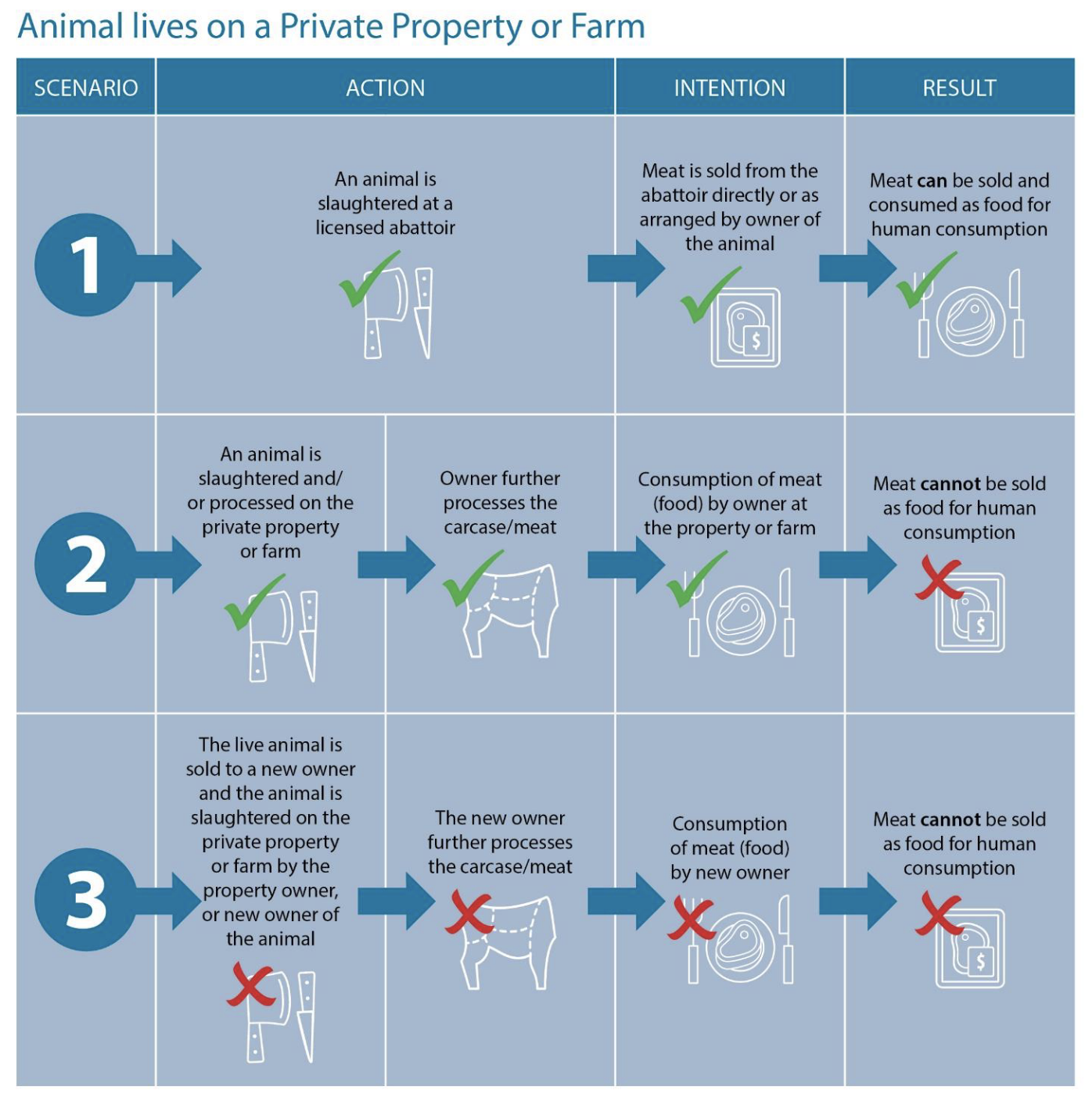
Slaughter of animals sold for human consumption Primefact, which includes definitions, FAQs and contact details for all relevant enforcement agencies. It also includes a graphic presenting different scenarios to assist in understanding what is allowed.
Slaughter of animals sold for human consumption Primefact, which includes definitions, FAQs and contact details for all relevant enforcement agencies. It also includes a graphic presenting different scenarios to assist in understanding what is allowed.
Japanese encephalitis in piggeries in NSW
Japanese encephalitis (JE) virus is a mosquito borne virus that may infect a range of species but occurs most commonly in pigs and horses.
NSW pig and livestock owners are urged to be alert for signs of JE in their animals, following confirmation of the presence of Japanese encephalitis virus (JEV) in samples from multiple piggeries in NSW, Victoria, South Australia and Queensland.
Infected pig properties have risk-assessed movement controls in place.
This is the first time JE has been detected in NSW livestock samples and suggests it is circulating in the higher-than-normal mosquito populations. The JEV can be transmitted to people and animals through the bites of infected mosquitoes but is not transmitted from person to person or from animal to animal.
Japanese encephalitis is not a food safety concern and commercially produced pork meat or products are safe to consume.
It can cause reproductive losses and encephalitis in susceptible species – mostly in pigs but can also rarely cause disease in people. The normal lifecycle of JE is between waterbirds and mosquitos, which may then accidentally spill over to pigs and horses if bitten by an infected mosquito.
With significant mosquito populations across the state, all piggeries are advised to improve mosquito monitoring and control on their properties. For more information on controlling mosquitoes around piggeries, visit the farm biosecurity website at farmbiosecurity.com.au/livestock/pigs/controlling-mosquitoes-around-piggeries/
How to identify the disease in pigs
- JEV is not spread directly from pigs to people, and it does not spread from pig to pig. The virus is primarily spread by mosquitoes.
- In pigs, the most common clinical signs are mummified and stillborn or weak piglets, some with neurological signs.
- Piglets infected after birth can develop encephalitis which presents as paddling or other neurological signs in the first six months of life.
- In other cases, wasting, depression or hindlimb paralysis may be seen in suckling piglets and weaners.
- Adult sows do not typically show overt signs of disease. If boars are present on farm, they may experience infertility and oedematous, and congested testicles.
Biosecurity (Japanese encephalitis) Control Order 2022
On 4 March 2022, the Biosecurity (Japanese encephalitis) Control Order 2022 was put in place. The Control Order applies to the whole of NSW and will be in place for the next two years.
The measures outlined in the Control Order are required to:
- Prevent, minimise, or manage the spread of Japanese encephalitis virus from infected premises to other areas in New South Wales.
- Minimise the impact on the continuity of the Australian pork industry.
These measures reflect existing Australian pig industry production practices.
A Guide has been developed to help pig owners and producers in NSW comply with the Control Order. To learn more, read the How to comply with the Biosecurity (Japanese encephalitis) Control Order 2022 here.
How to report symptoms
If you suspect JE in pigs, you must report it to your Local Land Services District Veterinarian immediately on 1300 795 299 or call the 24-hour Emergency Animal Disease Hotline on 1800 675 888.
More information on JEV is available from dpi.nsw .gov.au/jev.
For information on human health effects and ways to protect yourself, visit NSW Health. You can also access a range of JE resources here.
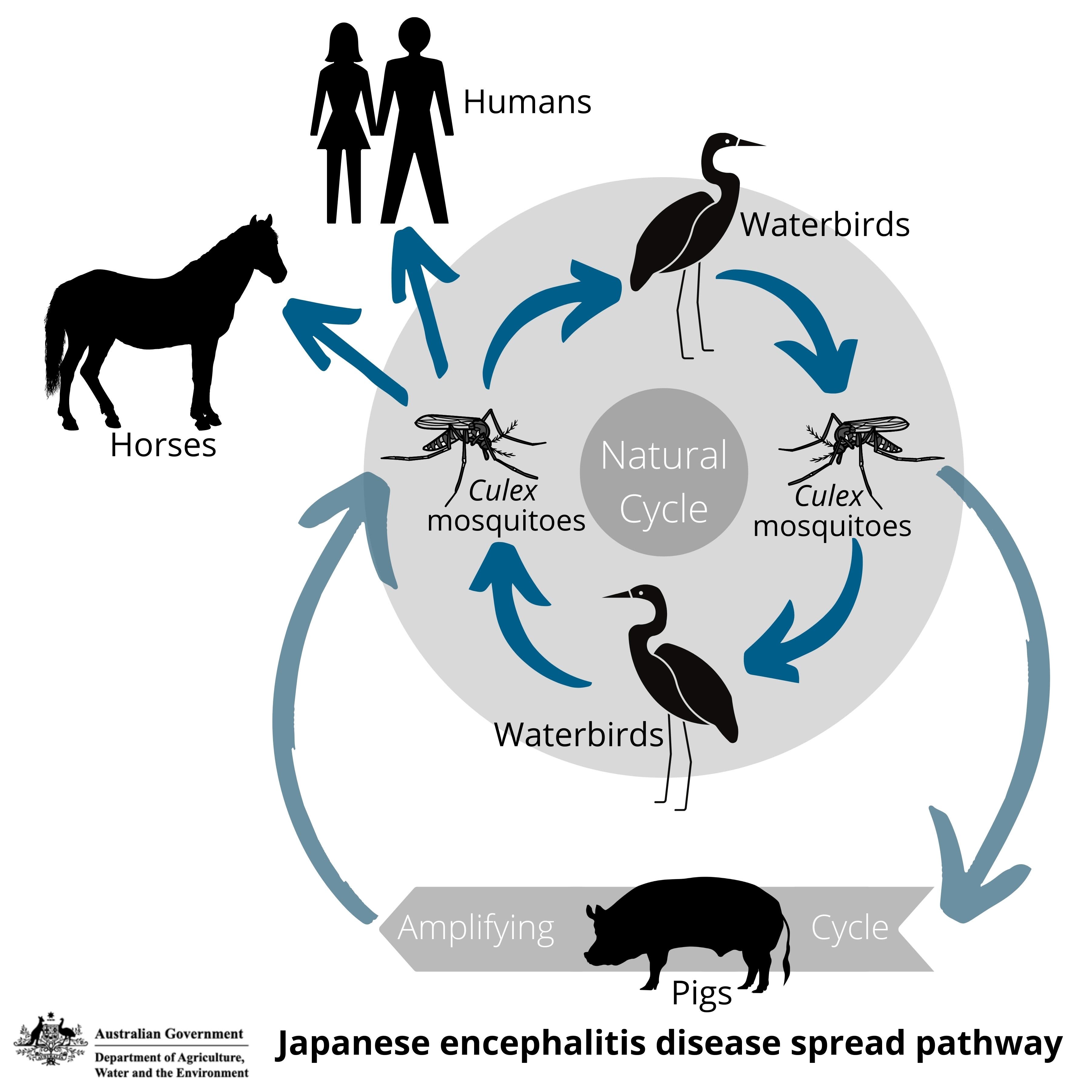
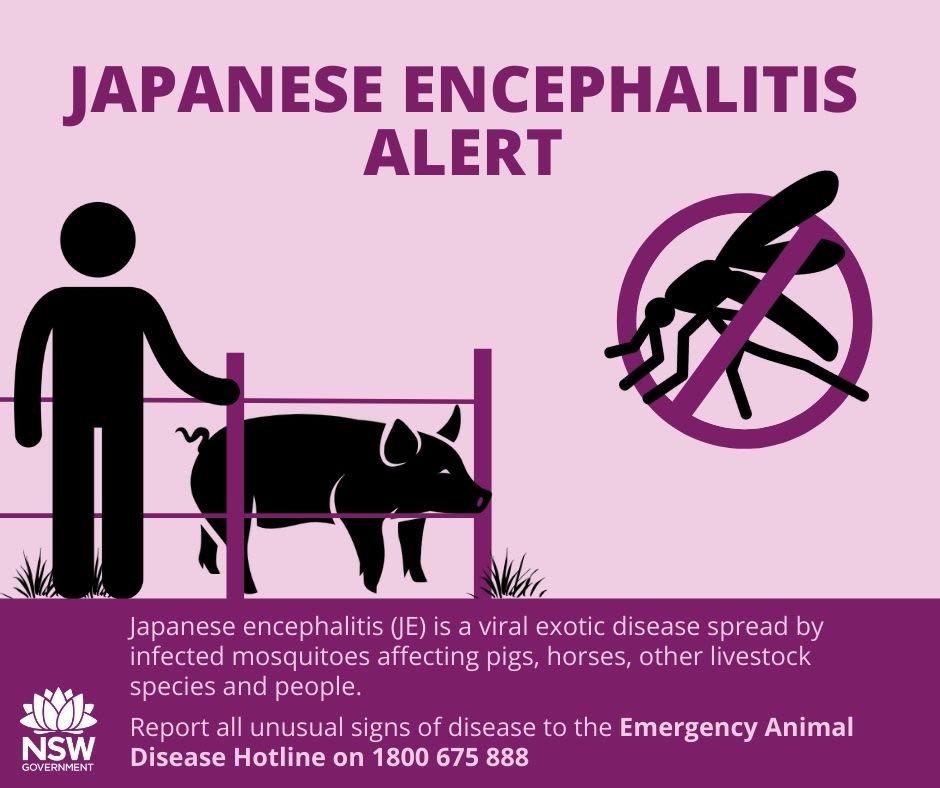
SEAFOOD

Inspections and audits
From October 2021 to December 2021, the Food Authority conducted 29 inspections and 45 audits of licensed seafood businesses. This industry sector has maintained a high compliance rate of 97% with no serious enforcement actions being taken.
The table below shows yearly comparable data for compliance and audit activity in the seafood sector between the same reporting periods in 2020 and 2021.
| Reporting period | Oct – Dec 2020 | Oct – Dec 2021 |
|---|---|---|
| Total audits | 74 | 45 |
| Total inspections | 61 | 29 |
| Compliance rate | 98% | 97% |
DAIRY
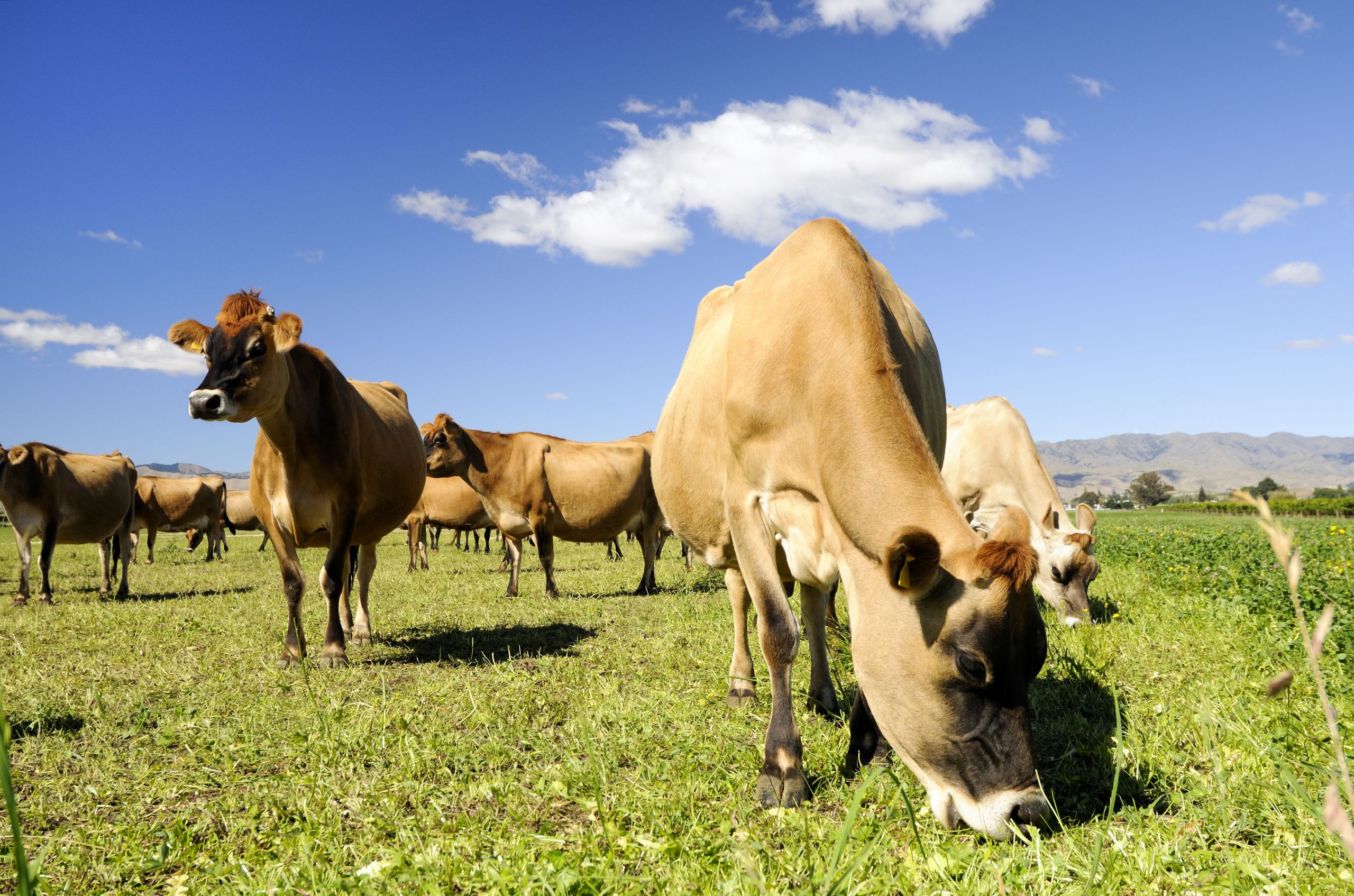
Inspections and audits
From October 2021 to December 2021, the Food Authority conducted 9 inspections and 68 audits of licensed dairy businesses. This industry sector has recorded a compliance rate of 95%. This industry sector has maintained a high compliance rate for an extended period due to industry commitment to food safety controls.
There were no serious enforcement actions taken against licensed dairy business during this period.
The table below shows yearly comparable data for compliance and audit activity in the dairy sector between the same reporting periods in 2020 and 2021.
| Reporting period | Oct – Dec 2020 | Oct – Dec 2021 |
|---|---|---|
| Total audits | 103 | 68 |
| Total inspections | 21 | 9 |
| Compliance rate | 98% | 95% |
Are you thinking about becoming an export registered dairy manufacturer?
The NSW Food Authority has published a Food Safety Program (FSP) manual that provides information and guidance helping small dairy processors meet their regulatory requirements under the Food Act 2003.
The Food Safety Program for Small Dairy Processors has been developed to identify and control risks in the pasteurisation of raw milk as well as guidance information for the production of yoghurt, cheese, ice cream/gelato, cream, butter and sour cream.
Small dairy processors must follow the manual to develop and implement a documented food safety program to fit their business and product requirements and ensure that all potential food safety hazards are identified and controlled.
Food businesses should keep a record and retain copies of action taken demonstrating compliance with the food safety program and ensure it is audited by a food safety auditor.
A copy of the manual and appropriate records must be made available to the food safety auditor when requested. All written reports of all food safety audit results for the previous 4 years should also be retained so they can be inspected by a food safety auditor or authorised officer when requested.
Small dairy processors are guided through the requirements for safely pastuerising milk as well as support program information for construction and maintenance of processing equipment, cleaning and sanitising, pest control, testing, and labelling and allergen requirements. A list of forms that small dairy processors should complete are also available at the end of the manual.
Guidance information in the manual covers purchase and receival of raw milk through to processing of products and distribution of finished products to retail outlets. The manual covers production guidance on the following products:
- Milk
- Dairy-based desserts and dips
- Ice creams and edible ices
- Yoghurt
- Sour cream
- Cheese
- Cream
- Butter
- Dried milk powder
Download a copy of the Food Safety Program for Small Dairy Processors
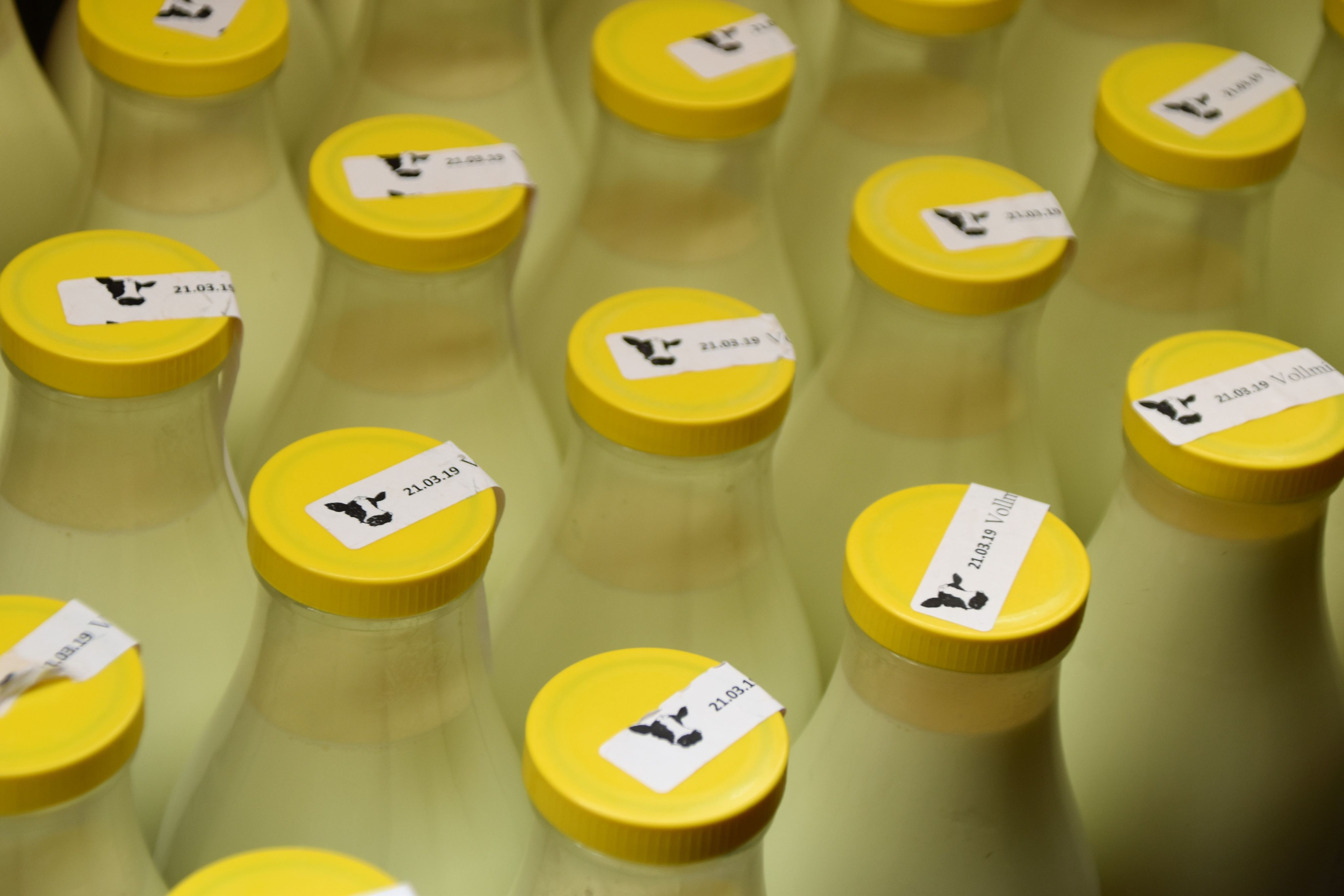
Photo by Waldemar Brandt on Unsplash
EGGS

Inspections and audits
From October 2021 to December 2021, the Food Authority conducted 39 inspections and 13 audits of licensed egg businesses. This industry sector has recorded a compliance rate of 95% for the reporting period.
The table below shows yearly comparable data for compliance and audit activity in the egg sector between the same reporting periods in 2020 and 2021.
| Reporting period | Oct – Dec 2020 | Oct – Dec 2021 |
|---|---|---|
| Total audits | 26 | 13 |
| Total inspections | 61 | 39 |
| Compliance rate | 74% | 95% |
Keeping backyard chickens? how to protect yourself, your birds, and our industries
NSW Department of Primary Industries, Biosecurity & Food Safety recently teamed up with Australian Eggs, Egg Farmers of Australia, and NSW Farmers to share an important biosecurity and food safety message for anyone keeping chickens as pets in their backyard, giving them access to their own freshly laid eggs.
The aim was to raise awareness and inform people that whether they are a commercial producer, or only keep a few chickens in the backyard, they have a responsibility to take steps to reduce biosecurity and food safety risks. Not only does it mean hens stay happy and healthy, but also helps to protect our agricultural industries from disease such as Avian Influenza and Salmonella and ensures people don’t get sick.
People who keep backyard chickens were reminded that if they are a small egg farmer (produce less than 20 dozen (240 eggs) a week) they need to ‘notify’ their flock with the NSW Food Authority before selling eggs – even if only selling from the farm gate, or at the local market.
Knowing the signs of disease is also an important part of protecting family and flock. People were advised to report any unusual signs of disease or death in chickens to their veterinarian, Local Land Services District Veterinarian, or the Emergency Animal Disease Hotline on 1800 675 888.
For more information about the simple steps people can take to reduce the chance of pests and diseases entering or spreading among backyard chickens and to protect your family from a foodborne illness, read the full factsheet Backyard Chickens here.
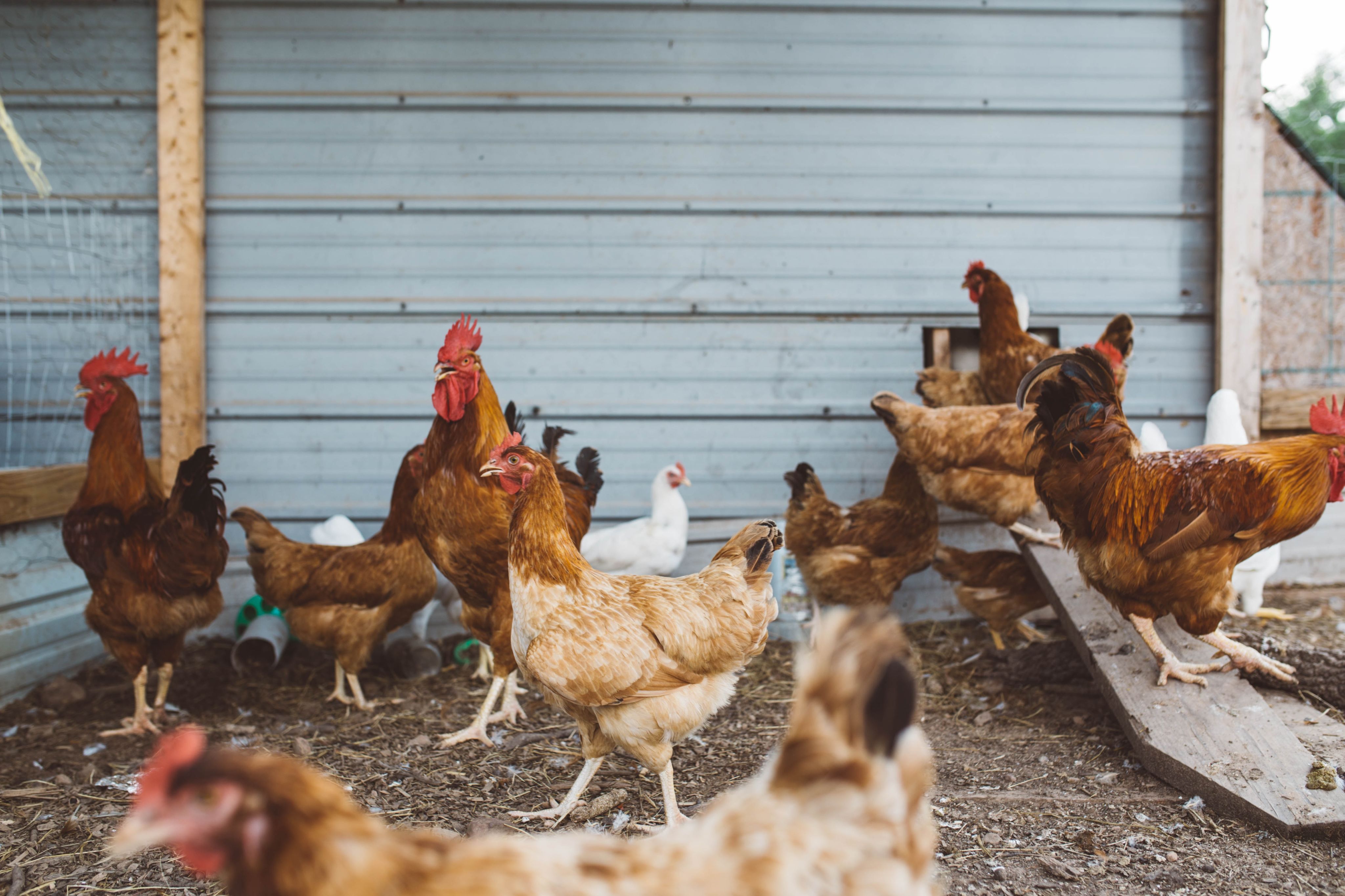
Photo by Brooke Cagle on Unsplash
PLANTS

Inspections and audits
From October 2021 to December 2021, the Food Authority conducted 3 inspections and 12 audits of licensed plant product businesses. This industry sector has recorded a high compliance rate of 99%.
The table below shows yearly comparable data for compliance and audit activity in the plant sector between the same reporting periods in 2020 and 2021.
| Reporting period | Oct – Dec 2020 | Oct – Dec 2021 |
|---|---|---|
| Total audits | 22 | 12 |
| Total inspections | 6 | 3 |
| Compliance rate | 100% | 99% |
VULNERABLE PERSONS

Inspections and audits
From October 2021 to December 2021, the Food Authority conducted 11 inspections and 258 audits of licensed hospitals and aged care businesses. This industry sector has maintained a high compliance rate with 97% of businesses recording an acceptable compliance result due to the correct implementation of food safety controls and ensuring staff have the necessary skills and knowledge.
The table below shows yearly comparable data for compliance and audit activity in the vulnerable persons sector between the same reporting periods in 2020 and 2021.
| Reporting period | Oct – Dec 2020 | Oct – Dec 2021 |
|---|---|---|
| Total audits | 293 | 258 |
| Total inspections | 26 | 11 |
| Compliance rate | 98% | 97% |
MANUFACTURING
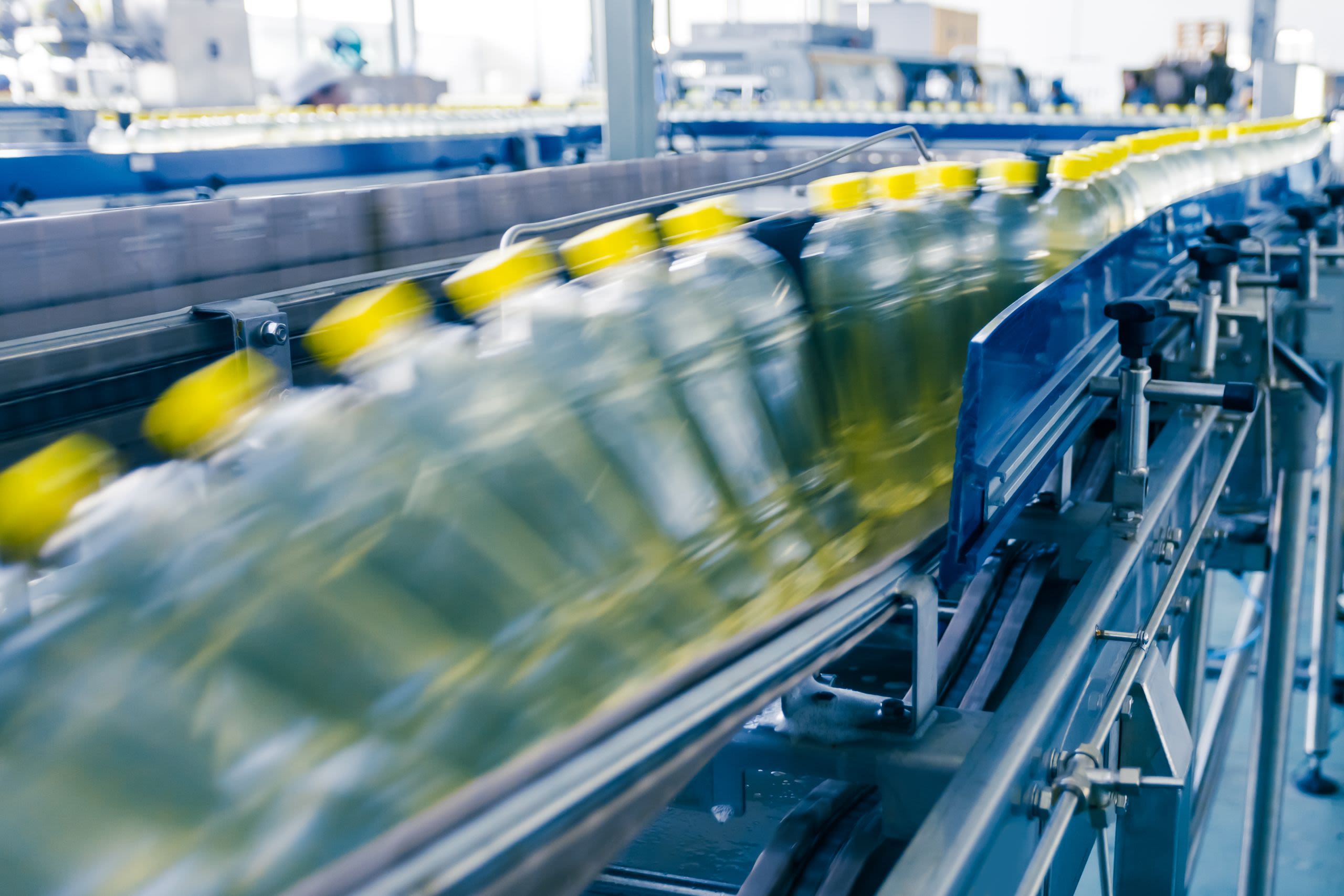
Do you import kava for sale or wholesale in NSW?
From 1 December last year, commercial imports of kava from Pacific Island nations resumed. From this date, importers have been able to apply for a permit to bring kava into Australia.,
There are important regulatory requirements and steps that must be taken in order to comply with the Food Act 2003 (NSW) (the Act) and the Australia New Zealand Food Standards Code (the Code) for the labelling and sale of kava in NSW. This includes notifying your enforcement agency before commencing any food handling operations – which includes processing, packaging, transporting and serving food.
How to notify
If your business is currently licensed or notified with either the NSW Food Authority or your local council, you simply need to check that the details you have previously provided are up to date. If they are, no further action is required.
If you are a retailer – you will need to notify your local council if you have not done so already. To do this, simply contact your local council. If you are not sure which council to contact see https://www.olg.nsw.gov.au/public/find-my-council/
If you are a wholesaler – you will need to notify the NSW Food Authority if you have not done so already. To notify, visit www.foodnotify.nsw.gov.au.
Businesses who do not notify the relevant enforcement agency of their food handling operations are committing an offence under the Act with heavy penalties applied.
Specific requirements that apply to kava
There are specific requirements relating to kava products which also need to be complied with. These include:
- Importation requirements
a. Product testing
b. A permit is required - Your responsibilities as an importer or supplier
a. Recall plan
b. Restrictions on how kava is sold
c. Labelling requirements specific to kava
d. Unpackaged kava
e. The legal requirements are changing - Other requirements.
More detailed information on the specific requirements listed above can be found here.
Food Standards Australia New Zealand, the body responsible for managing Australian food labelling legislation and policy, has also published information to help businesses meet food composition and labelling requirements. You can view this information at foodstandards.gov.au
Any questions relating to the import, labelling or sale of kava in NSW can be directed to the NSW Food Authority Helpline on 1300 552 406 or at food.contact@dpi.nsw.gov.au

Foodborne illness case study: Listeria monocytogenes in smallgoods
The Biosecurity & Food Safety (BFS) Compliance Investigations and Food Incident Response teams are responsible for conducting compliance and enforcement activities to verify a safe and secure food supply. These activities include investigations following reports of non-compliance and foodborne illness.
Compliance priorities are reviewed annually to ensure a risk-based approach to its enduring priorities is adopted, as well as to new and emerging food safety risks.
One of the key objectives under the Compliance & Integrity Systems Units Strategic Plan is the investigation of foodborne illness (FBI). In 2021, an FBI investigation relating to Listeria monocytogenes was undertaken, detailed below.
The investigation focussed on a NSW smallgoods manufacturer after ham produced by the business resulted in Listeria monocytogenes food poisoning in an interstate hospital out-patient.
Listeria monocytogenes is a commonly recognised foodborne pathogen that can be found in the food processing environment, particularly in the manufacture and packaging of ready-to-eat (RTE) meats and smallgoods.
An inspection of the smallgoods manufacturer by compliance officers was conducted where the facility’s processing areas were checked for compliance with regulatory requirements. An extensive number of food samples and environmental swabs were also collected and processing records for the contaminated batch, and operational processing and cleaning procedures were examined.
The inspection identified a number of maintenance, cleaning and cross contamination issues that could have contributed to the survival and growth of L. monocytogenes in the food processing environment. This included:
- A significant number of “small” maintenance issues such as damaged coving, small cracks in floors and wall and exposed wall insulation which can provide multiple harbourage points for listeria.
- Foot baths had been removed from the facility and replaced with a floor foaming unit. The floor foaming unit had not been verified as achieving a proven reduction in potential pathogens and appeared to not provide adequate coverage of the floor to be able to properly sanitise trolley wheels and boots in a corridor that was used for raw product, cooked product and movement of staff.
- The grates on the trough drains were seized into place so proper cleaning of the drains was difficult and had not been performed. L. monocytogenes was detected in the trough drains during the clearance process.
- A significant number of “small” cleaning issues indicate a larger problem with attention to detail with cleaning. E.g., floor squeegees that were damaged and unclean, mould growth around hand wash basin.
- There was cross over between raw and RTE product in a common use corridor which leads to the potential for contamination of trolley wheels entering the high care area.
The facility was immediately placed under a prohibition order which prohibited the production and sale of all product until it was confirmed cleared of L. monocytogenes, which took four weeks.
Facilities that are processing high risk RTE products need to be aware of the post-cook contamination risk of Listeria and have processes in place to identify harbourage sites and potential sites for cross contamination. This includes “minor” maintenance issues such as cracks and crevices and “small” cleaning issues such as mould and mildew.
Owners of older facilities need to keep up their maintenance of these issues and newer facilities need to not be complacent about maintenance and cleaning because their facility is “new”. Traffic flow at facilities needs to be reviewed to eliminate cross over points between raw and RTE product.
There have been several RTE meat-related listeriosis outbreaks in Australia, and the presence of L. monocytogenes in RTE meat products has led to product recalls, destruction of contaminated product, short term plant closures and extensive clean up procedures. These incidents can cause substantial losses for the businesses involved and can result in a loss of consumer confidence in the safety of meat products.
The full version of this case study can be downloaded here.

PROCESSES
FSANZ call for submissions
FSANZ invites written submission for the assessment of the following proposal by 6pm (Canberra time) 11 April 2022.
General procedure
- Proposal P1053 Food Safety Management Tools to consider food safety management requirements for the food service and retail sector.
CALENDAR
AIFST 2022 Food Microbiology Conference - Advancing the food microbiology domain
- Tuesday 5 April 2022 (virtual) - for more information and to register
Sydney Royal Easter Show
- Friday 8 – Tuesday 19 April 2022
Sydney Royal Aquaculture Competition
- Judging: Tuesday 12 April 2022 (in the Food Dome at the Sydney Royal Easter Show)
- Winners announced: Tuesday 12 April 2022
Retail Food Service & Information Session – Snowy Valleys Council
- Wednesday 18 May at Club Tumut
Sydney Fish Market Seafood Excellence Awards
- Wednesday 18 May
Regulatory Food Safety Auditor Training
- Wednesday 15 and Thursday 16 June 2022
Sydney Royal Cheese & Dairy Produce Show
- Judging Monday 20 June – Wednesday 23 June 2022
- Awards night Monday 27 June in the Stables
FRP Workshop
- 27-28 April 2023 at Rydges World Square Sydney



